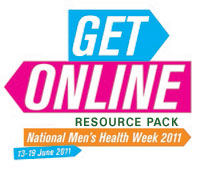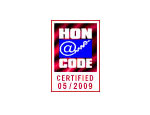My role
- About Us
The value of the internet
 We know that men don't go to the doctor as much as women or use other mainstream health services to the same degree.
We know that men don't go to the doctor as much as women or use other mainstream health services to the same degree. But we also know that men uses the internet. As long ago as 2006, more men used the internet than read a newspaper (ONS, 2006).
There are then three objectives then to Men's Health Week 2011:
- to get those men who are not using the internet online
- to encourage those men who are using the internet to use it to look for health information
- to empower those men already using the internet for health to use it more effectively and safely
In 2010, 9.2 million adults had never used the internet, down from 10.2 million in 2009 Some 30.1 million adults used it every day or nearly every day - almost double the estimate in 2006. About three-quarters of households - 73% - had internet access. (ONS Press Release 27.08.10)
In a survey for malehealth - obviously of men already using the inernet - nine out of 10 respondents saw the internet as their first or second port of call for health information.
Those men who chose the internet for health information were invited to tick the two most important reasons for their choice: 37% said that it was the quickest way; 20% that it was private; and 15% that there was more information on the internet than you could get anywhere else.
Respondents were also asked to identify the two main problems with looking up health information on the internet. Some 28% cited uncertainty about the accuracy of the information and 23% cited uncertainty about whether the information was up to date. Younger users were particularly concerned about accuracy.
The advantages of the internet
While the dangers of making gross generalisations around gender are clear, it could be argued that the internet offers a tight fit with some aspects of the traditional male gender role. For the man who believes he needs to be strong, silent and reluctant to admit weakness, uncertainty or limitations in his knowledge, the internet has clear benefits.
- The internet is quick giving it clear advantages for the delivery of health information and health services that need not be directly mediated by a health professional.
- The internet is private - this cannot be said for traditional medical services.
- The internet is free - certainly, the quality health information sites remain free.
- The internet makes an enormous quantity of information available - this can be an advantage but managing it requires information-handling skills that many do not have. There is also a tension between quantity of information and speed.
- The internet offers hyperlinks - ‘surfing’ is one of the pleasures of the internet and is particularly important with medical or health queries where the lay user rarely has the knowledge to formulate an exact query – or even a general one – at the outset.
- The internet has the potential to be up to date - unlike a printed publication or even the very best-trained and best-intentioned health
professional.
The challenges of internet information
- There too much information on the internet - using even the simplest site requires skill. As the number of pages on the web grows so the search engine and navigational skills required of the user will grow too.
- Information is inappropriate - an internet search will pull up information designed for the most expert of health professionals alongside information for five year-olds. The onus is on the recipient of the information rather than its provider to ensure that the information is at the appropriate level for them - again, this requires some skill
 Information is of variable quality - the solution to this, kite-marking, is beginning. The Health On The Net (HON) code standard, left, is an international standard. Accredited sites (including the MHF's malehealth) must be transparent about their funding, sponsorship and editorial policies and offer clearly dated, attributed and justifiable information. The Department of Health are also developing a UK standard but it is early days yet.
Information is of variable quality - the solution to this, kite-marking, is beginning. The Health On The Net (HON) code standard, left, is an international standard. Accredited sites (including the MHF's malehealth) must be transparent about their funding, sponsorship and editorial policies and offer clearly dated, attributed and justifiable information. The Department of Health are also developing a UK standard but it is early days yet.- Information is out of date - users need to look for dates. Users need a second or third opinion for undated pages.
- Search engines are poor information providers - they tend to prioritise sites that sell things and have a lot of links - neither are features of quality health information sites.
Page created on January 18th, 2011
Page updated on February 8th, 2011
Comments
In This Section
Haringey health humour
I'd rather admit I love John Ryan!


 Donate to the MHF
Donate to the MHF
 Man MOT
Man MOT